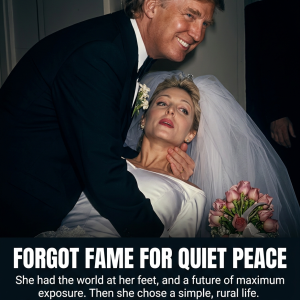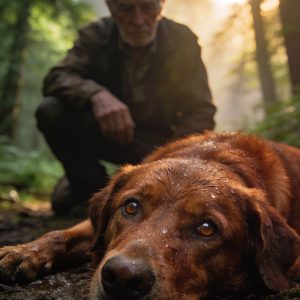I didn’t storm out of Indianapolis; I drifted away, closing the door so softly no one noticed the click. I left no forwarding address, handed in my two-week notice without cake or good-byes, and told only one soul—my sister Carly—where I was headed.
“Jay, you? In a Blue Ridge cabin?” Carly had scoffed on the phone, half-worried, half-teasing. “You once Googled ‘indoor mosquito.’”
She was right, but when you start feeling transparent in your own life, you’ll chase any path that promises density. I loaded my battered ’05 Tacoma with tools, canned beans, a water filter, and the ragged pieces of whoever I used to be.
The cabin—Grandpa’s forgotten outpost—had waited twenty years for a caretaker. It smelled of cedar, dust, and old promises.
For two euphoric weeks, silence pressed in like soft wool. No sirens, no vibrating phone—only wind sifting through hemlocks, owls gossiping at midnight, and floorboards muttering under my boots.
Then the donkey appeared.
It was “wood-chopping day”—my math said Thursday—and I was nursing instant coffee on the porch when something small and brown moved along the ridge. Not a mule deer—shorter legs, wider ears. A donkey, scruffy and intent, marched up, stopped three feet away, and stared like I’d parked in her spot.
Next dawn, she returned. Same hour, same unblinking inspection. By the fourth visit I christened her Dot—after the perfect black dot in the center of her forehead.
Dot shadowed every chore. She trailed me on hikes, stood guard while I split logs, and lay beside the fire pit while I traced constellations. She never brayed; her silence had its own gravity.
One sodden morning I overslept—no beans, no chores—until a gentle thump rattled the porch boards. Dot waited, patient as sunrise. Kneeling to scratch her ears, I saw faint scars lacing her coat and, half-hidden, a crude brand.
Borrowing a rust-red trailer from the local feed-store owner—no questions asked—I hauled her to a vet three towns over. Dr. Marta, brisk and kind, traced the scars with a gloved finger. “That brand isn’t a ranch mark,” she muttered. “Someone wanted her quiet… permanently.”
Dot stayed overnight; I stayed restless. Next morning, the vet handed me salve and a verdict: “She’s healthy—and bonded to you. Congratulations.”
Back at the cabin, solitude felt different—roomier somehow. I threw together a lean-to beside my half-sprouted garden, brushing Dot’s coat until it shone. Our days found cadence: feed, hike, stargaze, repeat. She healed; so did something in me.
Spring crept in with birdsong and, eventually, Carly. She arrived in fashion sneakers and oversized sunglasses, squinting at the wilderness like an alien landscape. “You own a donkey now,” she deadpanned.
We shared porch coffee while dawn painted the ridgeline. “You’re steadier,” she observed. I nodded toward Dot. “I needed something that needed me back.”
Healing, I realized, rarely explodes in epiphanies. It tiptoes in on hooves, asks for nothing louder than a scratch behind the ear, and teaches you to measure time by quiet companionship instead of phone notifications.
Dot still follows every trail, still stations herself at the porch by dawn. Yes, I talk to her—and maybe she answers in ways only my mended ribs can hear.
If you’ve ever run to the middle of nowhere expecting silence to fix you—only to discover that broken parts heal faster in gentle company—you’ll understand why I stayed.
Would you have taken Dot in? Share this story if a quiet friend once saved you, too.





